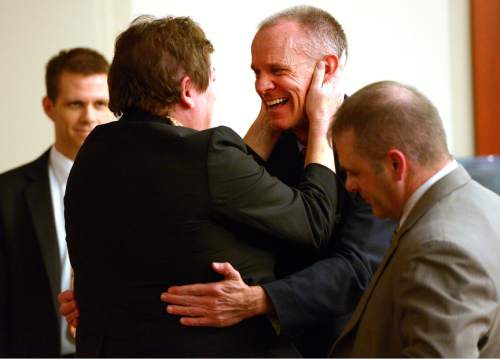This is an archived article that was published on sltrib.com in 2015, and information in the article may be outdated. It is provided only for personal research purposes and may not be reprinted.
A man who pleaded no contest to fraud charges for a resort development scheme with ties to the scandal that ensnared two former Utah attorneys general was ordered to prison Monday — but won't do a day behind bars if a restitution payment is made within 48 hours.
In fact, Stephen Roger Jenson's crimes will be reduced from felonies to misdemeanors that will be immediately expunged if he pays the $275,000 he owes to the court before 5 p.m. Wednesday.
"If you pay the restitution in full, there will be no probation at that point and the case would close," 3rd District Judge Elizabeth Hruby-Mills said at Jenson's sentencing hearing Monday. "If it's not paid by 5:01 on Wednesday, you would have 36 months' probation."
The deal is part of a plea agreement inked in January about a week into a trial for Jenson and his co-defendant and brother, Marc Sessions Jenson. The deal halted Stephen Jenson's portion of the case.
Weeks later, a jury acquitted Marc Jenson, who contended the case was filed only because he was at odds with former Attorneys General Mark Shurtleff and John Swallow.
In August 2011, the attorney general's office charged the Jensons with multiple felony counts of fraud and money laundering in connection with the failed, private Mount Holly golf and ski resort near Beaver.
Prosecutors said the brothers had failed to disclose required information to investors, including that Marc Jenson had past criminal convictions and personal bankruptcies and that the resort development was on the brink of foreclosure and threatened by lawsuits.
Defense attorneys for the men have maintained that the $3.5 billion Mount Holly project — with its luxury homes and private ski and golf facilities — was a legitimate enterprise that fell apart when a New York-based hedge fund that had backed the project cut its funding.
Stephen Jenson, 49, originally faced 11 second-degree felonies and, if convicted, could have spent up to 15 years in prison on each count. Instead he pleaded no contest to three felony counts of fraud.
By pleading no contest, Jenson was not admitting guilt, but acknowledged that the state likely had sufficient evidence to secure a conviction from a jury.
In exchange for his plea, prosecutors agreed not to recommend that Jenson serve time in prison or on probation as long as the restitution was paid in full before or by the time of sentencing.
The agreement also calls for Jenson's charges to be immediately reduced from felonies to class B misdemeanors and then expunged as soon as the restitution is paid.
On Monday, Hruby-Mills sentenced Jenson to the maximum zero to five years in prison for each count, but then suspended the punishment in favor of the terms of the plea agreement.
If Jenson fails to meet the Wednesday deadline for restitution, he will be placed on 36 months' supervised probation. He could still go to prison, but only if he ends up on probation and then does not comply with its terms.
Jenson's defense attorney, Edward Stone, assured the court Monday that the $275,000 payment, plus about $1,000 more in interest, would be paid.
The amount is far less than the combined losses of $2.3 million the three Colorado investors named as victims in the case had claimed. Stone told the judge the amount roughly totals the amount lost by one victim, who testified in January that he had invested his "life savings" in the Mount Holly project.
Deputy Utah County Attorney Tim Taylor had proposed dividing the restitution equally among the three victims — Jeffery Donner, Tracy Fox and Shaun Rothwell — but told the judge that only Fox and Rothwell had agreed to an equal split.
Donner's attorney, Justin Toth, objected to the proposal in court, saying the money should be divided in a way that reflects by percentage the amount each investor loss. Donner lost more than $1.5 million, while the losses by both Fox and Rothwell were $250,000 or less, he said.
"Those are profoundly different financial injuries and this is financial crime," Toth argued. "We think the appropriate way to divide up this restitution payment is to do so on a pro rata basis. That seems to be much fairer."
Hruby-Mills agreed with Toth and ordered Taylor to calculate the appropriate percentages for payment.
In 2013, Marc Jenson became a key player in the bribery and corruption investigation that left Shurtleff and Swallow charged with multiple felonies when he said the pair had pressured him for money and favors before and after he negotiated a plea agreement in a 2005 case.
Jenson's attorneys contend the Mount Holly prosecution, filed while Shurtleff was still at the helm, was political payback for refusing to cooperate with Shurtleff and Swallow.





